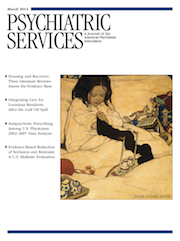Mental Health Court and Assisted Outpatient Treatment: Perceived Coercion, Procedural Justice, and Program Impact
Abstract
Objective
Mandated community treatment has been proposed as a mechanism to engage people with severe and persistent mental disorders in treatment. Recently, two approaches to mandate treatment through the courts have been highlighted: assisted outpatient treatment (AOT) and mental health court programs. This study examined levels of perceived coercion, procedural justice, and the impact of the program (mental health court or AOT) among participants in a community treatment system.
Methods
Data were analyzed from interviews with former AOT participants who were no longer under court supervision (N=17) and with graduates of a mental health court program (N=35). The MacArthur Admission Experience Survey, created to measure perceived coercion, procedural justice, and program impact on hospital admission, was modified to include judges and case managers.
Results
Mental health court graduates perceived significantly less coercion and more procedural justice in their interactions with the judge than did AOT participants. No significant difference was found between mental health court and AOT participants in perceptions of procedural justice in interactions with their case managers. Mental health court participants felt more respected and had more positive feelings about the program than did AOT participants.
Conclusions
Both mental health courts and AOT programs have potentially coercive aspects. Findings suggest that judges and case managers can affect participants’ perceptions of these programs by the degree to which they demonstrate procedural justice, a process that may affect the long-term effects of the programs on individuals.




